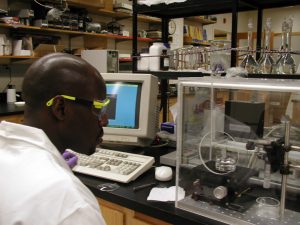
The research experience is one of the most effective ways to prepare undergraduates for careers in science, technology, engineering and mathematics (STEM). The intellectual challenges of research allow many students their first opportunity to apply their classroom learning in creative ways and to develop new knowledge and discoveries. When their research is conducted alongside other researchers such as graduate students, postdocs and faculty, the undergraduate gains the additional benefit of developing mentorship relationships and insights into the graduate school experience.
Richmond leads two programs that allow undergraduates to conduct world-class research under the direction of faculty members in the sciences while also earning money to defray the cost of their education. These two programs are (1) Research Experience for Undergraduates (REU) in Chemistry, Physics and Materials Science and (2) the Presidential Undergraduate Research Scholars (PURS) Program.

Richmond has directed the REU program with continuous funding from the National Science Foundation for the past 30 years. It is the longest running NSF REU program in the country and has involved over 400 students that have conducted research during the summer in several dozen faculty members’ laboratories in chemistry, physics and materials science. The students earn a n NSF stipend for the 10 week program and get free room and board through the generosity of the University of Oregon. Jeanne Basom of the Materials Science Institute assists with all logistical aspects of the program. More details and pictures can be found on the REU website.
The PURS program also designed and led by Richmond with the assistance of Dr. Karl Reasoner is a new one that is specifically designed for undergraduates to conduct research during the academic year, getting both credit and a stipend for their efforts. Ten students are selected each year to participate in the program that is largely focussed on the physical sciences. In addition to conducting their research the students attend scientific research seminars, practice giving scientific presentations, learn about postgraduate education and job opportunities. Each student is coupled with a faculty member that best matches their interests. The program is funded for five years through a generous donation of a University of Oregon alum. More details about this program can be found on the website.